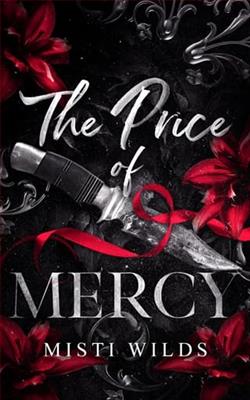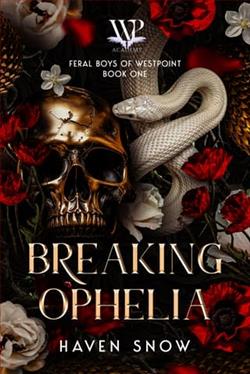Page 9 of Curse in the Quarter
“Multiple witnesses reported seeing people in the flames who couldn’t be accounted for in casualty lists,” Delphine continued. “Some described figures that appeared to be dancing or conducting some kind of ceremony even as the buildings burned around them.”
“Ritual magic,” Bastien said quietly.
“That’s one theory. Though officially, such explanations aren’t considered credible.” She gave him a sharp look. “I assume, given your profession, you’re more open-minded about alternative possibilities?”
“I’ve learned that ‘impossible’ is often just another word for ‘poorly understood.’”
“Good answer.” She smiled—the first genuine warmth he’d seen from her—and the expression transformed her face completely. For just a moment, she looked like Delia laughing at one of his dry observations, and the resemblance was so perfect it stole his breath.
She opened another folder, revealing genealogical charts. “Now, here’s where things get really interesting. The Lacroix family.”
The name seemed to burn itself into his vision. Charlotte Lacroix, born 1742, died 1763. Below her name, a family tree traced her bloodline forward through the centuries, showing marriages, births, and deaths in neat lines of black ink.
“The Lacroix family were prominent in colonial New Orleans,” Delphine explained, her finger tracing the genealogical connections. “They owned property throughout the Quarter, were patrons of the arts, heavilyinvolved in local politics. But they also had a reputation for unusual interests.”
“Unusual how?”
“Occult studies. Mystical practices. They maintained one of the largest private libraries of esoteric texts in North America.” She turned the page, revealing more detailed records. “Charlotte Lacroix, in particular, seems to have been deeply involved in what contemporary sources describe as ‘experimental natural philosophy.’”
Her finger lingered on Charlotte’s name, and the locket flared so hot against Bastien’s chest that sweat broke out along his hairline. She couldn’t know what she was touching—the incarnate echo of the woman who had loved him, who had bound her soul to his across lifetimes, who had died trying to preserve their connection through death itself.
“The family line continues through Charlotte’s younger sister, Marie,” Delphine continued, oblivious to his reaction. “Intermarriage with other prominent Creole families—the Moreaus, the Thibodauxs, the Boudreauxs. Standard genealogy for old New Orleans bloodlines.”
She traced the family tree forward through the centuries, her finger following the branching lines that led to present-day families still living in the Quarter, still carrying fragments of Charlotte’s bloodline.
“What’s particularly interesting,” Delphine said, opening another folder, “is that unexplained incidents seem to cluster around members of these family lines. House fires that burn in impossible patterns. Objects that move without explanation. People who report dreams of individuals they’ve never met.”
“You’re suggesting hereditary supernatural sensitivity.”
“I’m suggesting that certain bloodlines maintain connections to unconventional energy patterns. Whetherthat’s genetic, environmental, or something else entirely, I couldn’t say.” She pulled out a modern police report. “But the correlations are statistically significant.”
The report was dated three days ago—when the arcane recursion had begun. A woman named Magge Thibault had called police about her grandmother’s rocking chair moving by itself.
“How many similar incidents have been reported recently?” he asked.
“Seventeen in the past week. All involving families with documented connections to colonial-era Creole bloodlines.” Her voice carried the excitement of a researcher who’d uncovered an unexpected pattern. “It’s like something is awakening dormant connections across multiple family lines simultaneously.”
She had no idea how close to the truth she was. The arcane recursion wasn’t just affecting random supernatural events—it was targeting descendants of the families who had been connected to Charlotte’s original soul-tethering experiments.
“I’d like to see the complete list,” Bastien said.
“Of course.” She rose from her chair with fluid grace, and he caught a hint of jasmine and magnolia from her hair as she moved past him. The same perfume Delia had worn.
While she retrieved additional files, Bastien studied her more intently. The easy competence with which she navigated complex historical records. The sharp intelligence in her dark eyes when she discussed patterns and connections. The way she moved through the space with obvious familiarity and pride.
She was magnificent. Not despite being different from Delia, but because of it. This life had givenher opportunities for education and independence that 1906 couldn’t have provided.
And her eyes held not the faintest flicker of remembrance.
“Here we go,” she said, returning with an armload of folders. “Cross-referenced by family name, geographical location, and type of incident. I started compiling this after the third report came in—seemed like too much coincidence to ignore.”
As she spread the materials across the table, she began humming again—that same achingly familiar melody.
“Don’t apologize,” Bastien said when she caught herself. “It’s pleasant.”
She gave him a curious look, as if hearing something in his tone that didn’t match his casual words. “Most people find it annoying. Repetitive.”
“I find it comforting.”















